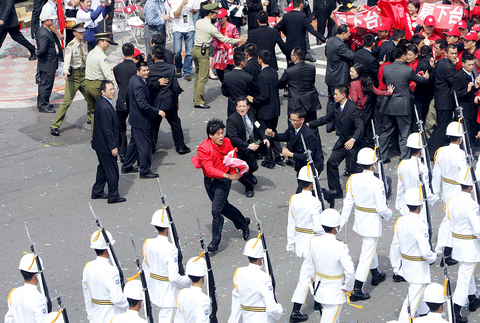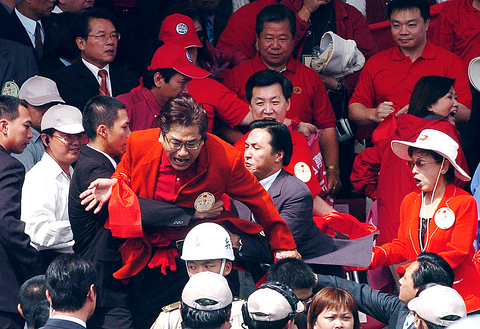Fist fights, vocal protests and minor scuffles marked yesterday's official national day celebrations, while President Chen Shui-bian (陳水扁) later brushed off tens of thousands of protesters calling for his resignation.
An official ceremony attended by foreign dignitaries yesterday was marred by scuffles between pan-green and pan-blue lawmakers while Chen was delivering the National Day speech outside the Presidential Office.
Later in the day, a group of protesters estimated at 120,000 by Taipei City police besieged the Presidential Office and called for the president to step down. The number was far short of the 1.5 million protesters organizers said had attended.

PHOTO: WALLY SANTANA, AP
Red-clad legislators
The day's festivities began with red-clad Chinese Nationalist Party (KMT) and People First Party (PFP) legislators attempting to disrupt Chen's speech, chanting "A-bian step down," making thumbs-down gestures and holding up red banners that read "Depose Chen."
PFP Chairman James Soong (宋楚瑜), who attended the ceremony for the first time since the Democratic Progressive Party (DPP) came to power six years ago, tried to lead his party members in approaching Chen during the middle of the president's speech.

PHOTO: SUNG CHIH-HSIUNG, TAIPEI TIMES
Security personnel quickly moved to prevent them from approaching the president and began to remove the lawmakers, who had turned violent. Security also snatched folding chairs from the hands of the angry legislators.
DPP legislators, who were sitting between the KMT and PFP groups, became enraged by the disruption.
Fist fight
DPP Legislator Lin Kuo-ching (
PFP Legislator Fu Kun-chi (
The celebration's preparatory committee said it had tried to prevent any conflict by erecting a white cloth barrier separating the lawmaker's seats from the president's grandstand.
Beating the barrier
Lee Ching-hua and KMT Legislator Chen Chao-jung (
Meanwhile, protesters had gathered around the fringes of the ceremony zone, and tried to block the four lanes of Zhonghua Road to prevent Chen Shui-bian's motorcade from leaving.
Unable to tell which car the president was in, the crowd rushed onto the road from the sidewalks whenever an official-looking black car appeared.
Several of the entrapped vehicles were carrying top government officials and foreign diplomatic guests. Protesters encircled the vehicles, smacking and kicking at the cars while shouting: "A-bian step down!"
Even before the ceremony began, DPP legislators including Lin Kuo-ching and Lee Ming-hsien (李明憲) had been blocked from entering by protesters, and had to be escorted into the ceremony by police.
A middle-aged woman caused a stir when, prior to the start of the ceremony, she threatened to immolate herself by igniting a bottle of liquid in the restricted area. Police carried the woman away, and the bottle was found to contain only water.
Presidential Office
The Presidential Office later yesterday issued a statement condemning the behavior of opposition legislators and the anti-Chen Shui-bian protesters.
The statement criticized the organizer of the protests, former DPP chairman Shih Ming-teh (施明德), for being "irresponsible and unwise" for organizing the siege, which it said was not only illegal, but also blocked traffic.
"They picked that particular time to create chaos and disturb the ceremony," the statement said. "They not only tarnished the nation's image, but also embarrassed the nation's leaders and disrespected foreign dignitaries."
Blasted
The Presidential Office also blasted opposition lawmakers for breaking a promise not to disturb the event, saying that their "irresponsible conduct" not only showed disrespect for the event coordinator, Legislative Speaker Wang Jin-pyng (王金平) of the KMT, but also destroyed the dignity of the ceremony.
Cabinet Spokesman Cheng Wen-tsang (
"It was a disgrace to our country for the world to see. The police should have stopped all the violence at the scene, but they did not," Cheng said.
DPP Chairman Yu Shyi-kun also condemned the pan-blue legislators' conduct, saying that the anti-Chen campaign had turned Double Ten National Day into a "national day of shame."
"Their illegal and violent behavior humiliated not only Taiwan, but also the Taiwanese people," Yu said, calling the protest and the "siege" a "ridiculous farce."
"They bear hatred in their minds instead of Taiwan," DPP Secretary-General Lin Chia-lung (林佳龍) sad.
"Over the past month, everyone was being very tolerant of the anti-Chen campaign, but it has been a month. It's enough," he said.
"Taiwan is a democracy where people can express their opinions freely, but what is illegal is wrong," he said.
Wang Jin-pyng said the official celebration had achieved a kind of "perfection," despite "a fly in the ointment."
"That was part of the pluralism of a democratic society, which is nothing to be surprised about. We can't say that we see it often, but we have seen such things before in the legislature. Just let it be," Wang said, referring to the skirmishes.
The legislative speaker said what had worried him most were potential attacks on the president and an invasion of the celebration area by anti-Chen protesters, but neither of these occurred.
"While there were shortcomings, one flaw cannot obscure the splendor of the jade," he said.
Meanwhile, KMT Legislator Lee Ching-hua went to a hospital "to have his wounds examined," saying that he would use the doctor's report to sue DPP lawmakers.
"My head aches. The DPP is a violent party. Even though I was injured, we have to continue the protest courageously," he told reporters at the hospital.
Asked for a response to Lee Ching-hua's comments, DPP Legislator Lin Kuo-ching said he was also injured, pulling up his trousers to show his bruises.
"Bruises are all over my body. He [Lee Ching-hua] said I hit him. If that's the case, who hit me?" he asked.
"If they [Lee Ching-hua and other pan-blue legislators] had just chanted slogans, I would be fine with that. But they did more than that. They even tried to pull down the stage's canopy," he said.
"What he did was not insulting to the president. He was insulting the Republic of China," Lin Kuo-ching said.
"It was they [the pan-blue legislators] who deserted the country. We were defending the country," he said of the conflict between pan-blue and DPP legislators at the ceremony.
He added that the pan-blue legislators' protest during the ceremony was "outrageous" and that they had "crossed the line."
He also complained that people from Shih's campaign had chased him and thrown things at his car as he and other DPP legislators were arriving for the ceremony.
"Taipei has really become a violent city. It is very ironic to call Shih's campaign a movement of `love and peace,'" he said.
DPP Legislator Wang Shih-cheng (
Yesterday morning, police focused on not allowing protesters to enter the Double Ten National Day celebration site, but did not remove protesters parading from several directions as they "besieged" the Presidential Office.
Some minor conflicts involving protesters occurred but ended soon after police intervened.
At 8am, more than 100 protesters attempted to block a military police motorcycle team from entering the site, but police quickly stopped them.
Fifteen Taipei prosecutors were deployed around the protests to monitor events.
The lead prosecutor of the Taipei District Prosecutors' Office, Huang Ho-tsun (
Reporters: Mo Yan-chih, Ko Shu-ling, Jimmy Chuang, Shih Hsiu-chuan, Flora Wang and Rich Chang
also see stories:
Editorial: A day of national embarrassment
Pundits expect TAIEX to consolidate

INVESTIGATION: The case is the latest instance of a DPP figure being implicated in an espionage network accused of allegedly leaking information to Chinese intelligence Democratic Progressive Party (DPP) member Ho Jen-chieh (何仁傑) was detained and held incommunicado yesterday on suspicion of spying for China during his tenure as assistant to then-minister of foreign affairs Joseph Wu (吳釗燮). The Taipei District Prosecutors’ Office said Ho was implicated during its investigation into alleged spying activities by former Presidential Office consultant Wu Shang-yu (吳尚雨). Prosecutors said there is reason to believe Ho breached the National Security Act (國家安全法) by leaking classified Ministry of Foreign Affairs information to Chinese intelligence. Following interrogation, prosecutors petitioned the Taipei District Court to detain Ho, citing concerns over potential collusion or tampering of evidence. The

NEGOTIATIONS: Taiwan has good relations with Washington and the outlook for the negotiations looks promising, Minister of Economic Affairs J.W. Kuo said Taiwan’s GDP growth this year is expected to decrease by 0.43 to 1.61 percentage points due to the effects of US tariffs, National Development Council (NDC) Minister Paul Liu (劉鏡清) said at a meeting of the legislature’s Economics Committee in Taipei yesterday, citing a preliminary estimate by a private research institution. Taiwan’s economy would be significantly affected by the 32 percent “reciprocal” tariffs slapped by the US, which took effect yesterday, Liu said, adding that GDP growth could fall below 3 percent and potentially even dip below 2 percent to 1.53 percent this year. The council has commissioned another institution

NEGOTIATIONS: The US response to the countermeasures and plans Taiwan presented has been positive, including boosting procurement and investment, the president said Taiwan is included in the first group for trade negotiations with the US, President William Lai (賴清德) said yesterday, as he seeks to shield Taiwanese exporters from a 32 percent tariff. In Washington, US Trade Representative Jamieson Greer said in an interview on Fox News on Thursday that he would speak to his Taiwanese and Israeli counterparts yesterday about tariffs after holding a long discussion with the Vietnamese earlier. US President Donald Trump on Wednesday postponed punishing levies on multiple trade partners, including Taiwan, for three months after trillions of US dollars were wiped off global markets. He has maintained a 10 percent

TRADE: The premier pledged safeguards on ‘Made in Taiwan’ labeling, anti-dumping measures and stricter export controls to strengthen its position in trade talks Products labeled “made in Taiwan” must be genuinely made in Taiwan, Premier Cho Jung-tai (卓榮泰) said yesterday, vowing to enforce strict safeguards against “origin laundering” and initiate anti-dumping investigations to prevent China dumping its products in Taiwan. Cho made the remarks in a discussion session with representatives from industries in Kaohsiung. In response to the US government’s recent announcement of “reciprocal” tariffs on its trading partners, President William Lai (賴清德) and Cho last week began a series of consultations with industry leaders nationwide to gather feedback and address concerns. Taiwanese and US officials held a videoconference on Friday evening to discuss the